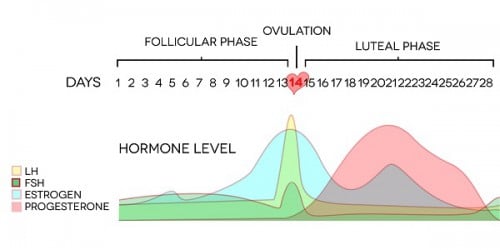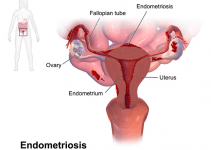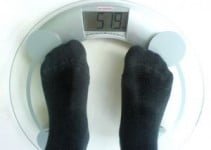Do you know about the hormonal changes during menstrual cycle? Most women don’t, but if you know how a menstrual cycle works normally then it will be easier for you to understand hormone imbalance.
A menstrual cycle results from hormonal changes between the ovaries and the brain’s pituitary gland. Every month, your body will be prepared for pregnancy by the female sex hormones and menstruation or period will come if there is no fertilization. A typical cycle last for about 24 to 35 days, but it could be longer or shorter.
On the first day of the menstrual cycle, the levels of your estrogen and progesterone hormones will decrease. Lower levels of these hormones will send signals the pituitary gland for it to produce the Follicle Stimulating Hormone (FSH) and Luteinizing Hormone (LH). FSH hormone starts the maturing process of a follicle, the fluid-filled sac inside the ovary that contains an egg and LH causes release of estrogen and progesterone from growing follicles in the ovary.
The follicle will produce a lot more of the estrogen hormone to prepare your uterus for pregnancy. The levels will increase about day twelve to fourteen at the time of ovulation and trigger a sudden rise in the Luteinizing Hormone (called LH surge) from the pituitary gland and cause the follicle to release the egg.
The ruptured follicle is converted into corpus leuteum by LH which starts secreting progesterone to stimulate secretions from uterine gland in order to make favorable environment for implantation.
The hormone levels will drop and your period will start on day twenty-eight if fertilization doesn’t occur.
The menstrual cycle will take place in three stages, the luteal, follicular and ovulatory. The follicular is the first half, the luteal is the second and the ovulatory is midway between days twelve and sixteen.
Let’s take a closer look at the vital menstrual cycle hormones:

Luteinizing Hormone is released out the pituitary gland during the follicular phase and surges at ovulation, it causes a rupturing of the mature follicle to release the egg and convert ruptured follicle into Corpus Leuteum.
Follicle Stimulating Hormone is released also from the pituitary gland to stimulate the ovarian follicles to mature.
Estrogen is one of the women’s sex hormones and it’s responsible for the maturing and growing of the uterine lining that will shed during your period as well as matures an egg before ovulation.
It also plays role in development of primary and secondary female sexual characters.
Progesterone is another female sex hormone and it works to balance out the effects of the estrogen. It is produced after your ovulation time by the corpus luteum and would dominate the second half of your cycle.
The main role of this hormone is control how the uterine lining builds up as well as helps with the maturing and the maintenance of the lining when pregnancy occurs. The progesterone hormone levels will fall if you are not pregnant and the uterine lining will shed to start your menstrual cycle.
There are additional resources available if you need to know more about the hormonal changes during menstrual cycle.
Image: Bigstock




My last period was jan.1 and i took a pregnancy test last night Feb 20 but still negative? My cycle is usually 40 to 45 days. Thank you